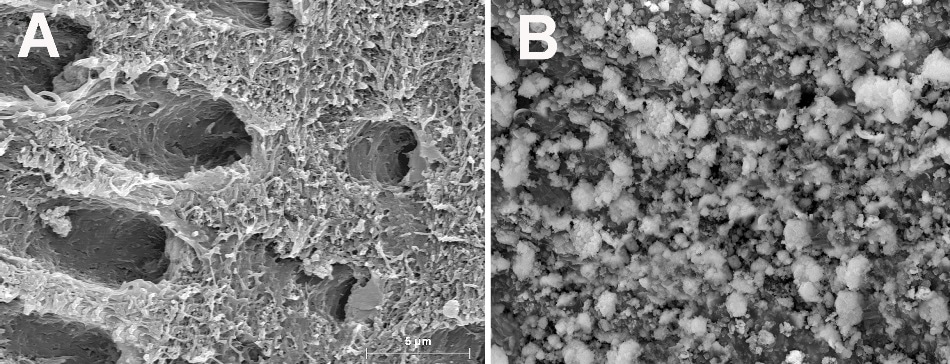Jul 4 2017
Innovative dental biomaterials for the regeneration of dental hard tissues have been developed as an outcome of the collaboration of Salvatore Sauro, Professor of Dental Biomaterials and minimally invasive dentistry at CEU Cardenal Herrera University, in Spain, with several Researchers from Finland, Brazil, Belgium, Germany and the UK.
 A: Demineralized dentin with a number of collagen fibres, that if not preserved and remineralized, these can be degraded by the action of the dentinal proteolytic enzymes. B: Dentin treated with resin with fluoride-containing bioactive glass, which presents mineral precipitations – signs of remineralization. Credit: Asociacion RUVID
A: Demineralized dentin with a number of collagen fibres, that if not preserved and remineralized, these can be degraded by the action of the dentinal proteolytic enzymes. B: Dentin treated with resin with fluoride-containing bioactive glass, which presents mineral precipitations – signs of remineralization. Credit: Asociacion RUVID
Bacterial plaque causes tooth decay because of the acids produced by varied bacteria species; this has set off an in depth research activity for the development of unique restorative biomaterials comprising of protective and self-healing remineralizing properties. In this new study, Salvatore Sauro has collaborated with several Researchers in order to achieve this target. Indeed, this global research group produced two new dental restorative biomaterials made up of bioactive glasses, and studied their effectiveness in decreasing the enzymatic auto-degradation of collagen fibers and suggesting their remineralization.
This study focuses on evaluating the inhibition of endogenous proteolytic enzymes of dentin and the remineralization induced by two varied innovative experimental resins comprising of bioactive glasses: one containing micro-particles of an experimental bioactive glass enriched with increased amount of phosphates and fluoride and the other containing micro-particles of Bioglass 45S5. Evaluation of their anti-degradation effects took place on totally demineralized human dentin specimens after being immersed in artificial saliva for a time span of 30 days with the help of an immunohistochemical process. The remineralization brought about by such experimental bioactive resins was also analyzed by means of scanning electron microscopy and infrared spectroscopy.
Greater effectiveness with fluoride and phosphates
The resin-based material containing the experimental bioactive glass enriched with fluoride and phosphates resulted to be more efficient in inhibiting the enzymatic-mediated degradation of demineralized dentine collagen, and more bioactive than the one containing Bioglass 45S5. This was mainly due to the fluoride ions as well as to the large amount of phosphates released by the material, which accelerated dentin remineralization and reduced the degradation of demineralized dentin collagen via inhibition of matrix metalloproteinases and cysteine cathepsins.
Professor Salvatore Sauro and his Co-Authors
Thus, this type of experimental bioactive material is considered to be more ideal for developing new restorative dental materials used for the clinical treatment of the dental caries.
Publication in the Journal of Dental Research
Professor Sauro executes his research activity mainly at CEU Cardenal Herrera University, (Spain) and also at King’s College London (UK) where he has an honorary position as Research Senior Lecturer. He spends ample time in the development of minimally invasive treatments and therapeutic bioactive dental composites ideal for the treatment and restoration of caries affected dentin, such as those tested in this study – that seem to be capable of preventing the degradation of dentin collagen and evoking the remineralization of demineralized dental tissues. In this study, Dr Salvatore Sauro partnered with Researchers from the Department of Restorative Dentistry of the University of Turku (Finland); the Faculty of Dentistry of the University of Fortaleza (Brazil); the Biomaterials Group of the University of Ghent (Belgium); the Friedrich Schiller University of Jena (Germany); and the Dental Institute of King's College London (United Kingdom), institution of which Salvatore Sauro is a Visiting Senior Lecturer.
The study has been published in Dental Research, one of the top-ranked journals in the field. The CEU-UCH Indicator Consolidation Programme, the Academy of Finland, and the EVO funding from the Turku University Hospital in Finland, funded this study.